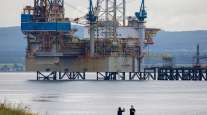OPEC Plans Informal in September, Sees Oil Dip as Temporary
“Expectation of higher crude oil demand in the third and fourth quarters of 2016, coupled with decrease in availability, is leading the analysts to conclude that the current bear market is only temporary” and prices will increase later this year, Mohammed Al Sada, Qatar’s energy minister and holder of OPEC’s rotating presidency, said in a statement on the group’s website. Members constantly discuss ways to stabilize the market, he said.
Oil tumbled into a bear market last week, ending a recovery that saw prices almost double from a 12-year low in February. This keeps pressure on many member countries that are still unable to balance their budgets. Al Sada’s comments indicate OPEC is concerned by the renewed slide in prices, according to Robin Mills, chief executive officer of consultant Qamar Energy.
“If they’re going to talk about anything that’s worth announcing to the market, it would have to be an idea like the previously proposed freeze in oil production,” Mills said by phone from Dubai. “I don’t hold much credence in that coming about, but they could be in a better condition to agree on a freeze by the end of the year than they have been.”
West Texas Intermediate crude rose to the highest level in almost two weeks, gaining as much as 2.8% to $42.97 a barrel as of 10:26 a.m. EDT on the New York Mercantile Exchange on July 8.
OPEC ministers, who rejected a proposal to adopt a new output ceiling when they last met in June, had always planned to continue discussions at the International Energy Forum Ministerial Meeting in Algeria next month, two delegates from the group said Aug. 5. Members have no specific plans to renew the failed April agreement with nonmembers to freeze oil production, they said.
OPEC Secretary General Mohammad Barkindo met with Wilson Pastor, Ecuador’s OPEC governor, in Vienna on Aug. 5 to discuss issues including planning for the IEF, which runs Sept. 26-28, according to a statement on the group’s website. Venezuela Oil Minister Eulogio del Pino has also spoken with Barkindo about holding a meeting with nonmember countries, President Nicolas Maduro said in a national address during the week ended Aug. 6.
Russia sees no need for renewing discussion of an oil-output freeze at current crude prices, while leaving open the possibility for the future, Energy Minister Alexander Novak told journalists in Moscow on Aug. 8. Novak didn’t rule out speaking with his counterparts from OPEC member states in Algiers.
Russia, Saudi Arabia and other major oil exporters met in Doha, Qatar, in April in a bid to stabilize global markets by putting caps on output. The effort collapsed after Saudi Arabia demanded that rival Iran be a part of the agreement. At the time, Iran had ruled out any limits on its output as it ramped up production after the lifting of international sanctions.
Iran will probably raise production to pre-sanctions levels by the end of the year, while Saudi Arabia also will be selling more crude as domestic use of fuel during the country’s summer months slows, Mills said.
Iran is pumping about 3.8 million barrels of crude a day and exporting about 2 million of that, Mohsen Ghamsari, director of international affairs at National Iranian Oil Co., said in an interview in Tehran last month. That’s allowed it to return to about 80% of the market share it had before the restrictions, he said.
The latest drop in prices won’t last and reflects weaker refining margins, a surplus of refined products and the U.K.’s vote to leave the European Union and its impact on the financial markets, Al Sada said.




